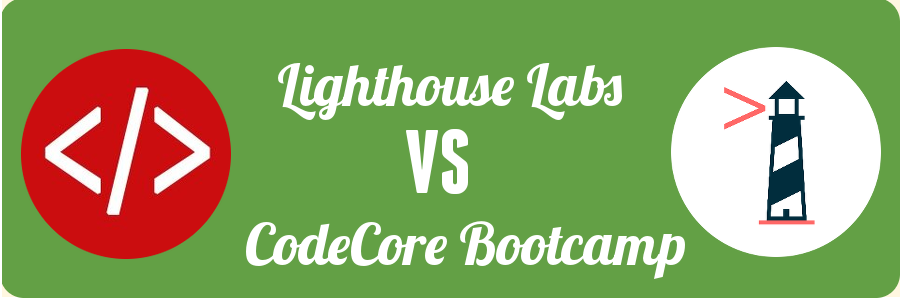blog article
Lighthouse Labs vs. CodeCore
![]()
Written By Liz Eggleston
![]()
Written By Liz Eggleston
Course Report strives to create the most trust-worthy content about coding bootcamps. Read more about Course Report’s Editorial Policy and How We Make Money.
Course Report strives to create the most trust-worthy content about coding bootcamps. Read more about Course Report’s Editorial Policy and How We Make Money.

Lighthouse Labs and CodeCore are the two top coding bootcamps in Vancouver, Canada. With similar offerings, which bootcamp should you attend? Let's compare the two schools to find which is the best fit.
CodeCore prides itself in strong mentorship from alumni and community members. CodeCore representative Tammam Kbeili cites their "commitment to the success of our students and our personalized one-on-one approach to student mentorship. This approach has led to a strong sense of community at CodeCore, with many alumni returning to campus to help one another, share ideas or seek additional guidance on their career path."
Lighthouse Labs has a unique approach, employing up to 25 TAs for a course. Mike Steele, Marketing Director for Lighthouse Labs, explains: "Although our head teachers are full time, we employ a network of 25+ TAs that come in part time, when they aren't working as full-time senior developers in Vancouver. So in addition to the network of fellow junior developers, our students also graduate with a network of senior developers at companies ranging from Hootsuite, Bench, Axiom Zen, and more."
Both Lighthouse Labs and CodeCore offer iOS and Web Development courses. Lighthouse Labs will teach Ruby on Rails, JavaScript, HTML, CSS, popular APIs, software architecture, responsive design, test driven development, angular.JS and node.JS.
CodeCore bootcamps teach their Web Development students Ruby on Rails, HTML5 & CSS3, JavaScript, jQuery, software architecture, object oriented development, UX, UI, and popular APIs.
Students in the Lighthouse Labs and CodeCore iOS course will learn Objective-C and Swift, although Lighthouse Labs points out that their emphasis will be on more established languages, with less of a focus on Swift.
Lighthouse Labs does not currently offer part-time courses the way CodeCore does.
CodeCore operates in a recently renovated building in the heart of Downtown Vancouver, close to historic Gastown. Lighthouse Labs credits their location in Launch Academy for the strong community network, allowing "our students to rub elbows every day with successful tech entrepreneurs, senior developers, and potential mentors. Many students get hired by companies right here in this office."
Both Lighthouse Labs and CodeCore are accredited by the PCTIA. As of this summer 2015, CodeCore is now a fully accredited institution in British Columbia.
Tuition for each school is in the same price range, although Lighthouse Labs rings in at $7,000 for Web Development courses and $8,000 for iOS courses; CodeCore is $7500 for both offerings.
Lighthouse Labs lasts 8 weeks at 60+ hours/week. CodeCore bootcamps are a bit longer, lasting 9 weeks and running once per quarter.
CodeCore boasts a high placement rate. Tammam says, "CodeCore has established a reputation in Vancouver for having top quality education. Our graduates are edging out interns from other schools to land well-paying full-time junior developer positions with local companies. Our track record for student placement has been exceptional, 100% of students from all of our cohorts who were seeking employment as developers after graduation, placed in positions and currently working."
Mike Steele of Lighthouse Labs cites their job placement rate: "We currently boast a 100% placement rate. This means we find all our grads who want jobs a co-op within 3 months of graduation (average placement time is closer to 2 weeks)." Lighthouse Labs's high placement rate may be attributed to their low acceptance rate. Rahul of Lighthouse Labs says, "The applications have all been great and I would love more applications; the more selective I can be, the happier I am. We’re always looking for ways to increase our selectivity; I think right now we’re taking 1 in 3. I’d like that to get to 1 in 7 if I could."
Both Lighthouse Labs and CodeCore are proud of their alumni networks. Mike Steele of Lighthouse Labs explains their approach to the alumni network: "We have a highly active alumni base. Even once our students graduate and get hired, we still set them up with multiple opportunities. We have an Alumni Workspace set aside especially for them to drop in and code any time, which at present is being used by 3 grads creating their own startup, Fetch. We also arrange events such as next week's GROW hackathon, which we are providing a bus and free attendance for ~20 of our alumni to go up there and hack. We also have a program in which we set up a recent grad and one of our senior teachers with a paying client to work on small projects."
Tammam of CodeCore describes their "strong sense of community at CodeCore, with many alumni returning to campus to help one another, share ideas or seek additional guidance on their career path."
We hope this article has helped point out some of the nuanced differences between Lighthouse Labs and CodeCore- comment on this article with questions you'd like to see answered.

Liz Eggleston, CEO and Editor of Course Report
Liz Eggleston is co-founder of Course Report, the most complete resource for students choosing a coding bootcamp. Liz has dedicated her career to empowering passionate career changers to break into tech, providing valuable insights and guidance in the rapidly evolving field of tech education. At Course Report, Liz has built a trusted platform that helps thousands of students navigate the complex landscape of coding bootcamps.
Sign up for our newsletter and receive our free guide to paying for a bootcamp.
Just tell us who you are and what you’re searching for, we’ll handle the rest.
Match Me